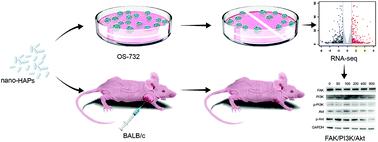当前位置:
X-MOL 学术
›
Biomater. Sci.
›
论文详情
Our official English website, www.x-mol.net, welcomes your
feedback! (Note: you will need to create a separate account there.)
Anti-osteosarcoma effect of hydroxyapatite nanoparticles both in vitro and in vivo by downregulating the FAK/PI3K/Akt signaling pathway.
Biomaterials Science ( IF 5.8 ) Pub Date : 2020-07-03 , DOI: 10.1039/d0bm00898b Renxian Wang 1 , WeiFeng Liu , Qian Wang , Guangping Li , Ben Wan , Yuyang Sun , Xiaohui Niu , Dafu Chen , Wei Tian
Biomaterials Science ( IF 5.8 ) Pub Date : 2020-07-03 , DOI: 10.1039/d0bm00898b Renxian Wang 1 , WeiFeng Liu , Qian Wang , Guangping Li , Ben Wan , Yuyang Sun , Xiaohui Niu , Dafu Chen , Wei Tian
Affiliation

|
Numerous studies have reported that hydroxyapatite nanoparticles (nano-HAPs) can inhibit the proliferation of a variety of tumor cells and this effect is different in different carcinoma cells. However, the effect of nano-HAPs on osteosarcoma cell proliferation has not been well understood thus far. In this study, we first showed that our synthesized nano-HAPs reduced cell viability and inhibited migration and invasion of OS-732 cells in a concentration-dependent manner. Using a BALB/c nude mouse tumor model, we demonstrated that nano-HAPs could effectively suppress tumor growth in vivo. We also performed RNA-seq analysis to investigate the underlying mechanism of these effects and discovered that treatment of OS-732 cells with nano-HAPs significantly downregulated the FAK/PI3K/Akt signaling pathway. Collectively, our study suggests that treatment with nano-HAPs can inhibit osteosarcoma cell growth, migration and invasion in vitro and suppress osteosarcoma in vivo.
中文翻译:

通过下调FAK / PI3K / Akt信号通路在体外和体内羟基磷灰石纳米颗粒的抗骨肉瘤作用。
大量研究报告称,羟基磷灰石纳米颗粒(nano-HAPs)可以抑制多种肿瘤细胞的增殖,并且这种作用在不同的癌细胞中是不同的。然而,到目前为止,对纳米HAPs对骨肉瘤细胞增殖的作用还没有很好的了解。在这项研究中,我们首先表明我们合成的纳米HAP以浓度依赖的方式降低了细胞活力,并抑制了OS-732细胞的迁移和侵袭。使用BALB / c裸鼠肿瘤模型,我们证明了纳米HAP可以有效抑制体内肿瘤的生长。我们还进行了RNA序列分析以研究这些作用的潜在机制,并发现用nano-HAPs处理OS-732细胞可显着下调FAK / PI3K / Akt信号通路。总体而言,我们的研究表明,纳米HAPs的治疗可以在体外抑制骨肉瘤细胞的生长,迁移和侵袭,并在体内抑制骨肉瘤。
更新日期:2020-08-11
中文翻译:

通过下调FAK / PI3K / Akt信号通路在体外和体内羟基磷灰石纳米颗粒的抗骨肉瘤作用。
大量研究报告称,羟基磷灰石纳米颗粒(nano-HAPs)可以抑制多种肿瘤细胞的增殖,并且这种作用在不同的癌细胞中是不同的。然而,到目前为止,对纳米HAPs对骨肉瘤细胞增殖的作用还没有很好的了解。在这项研究中,我们首先表明我们合成的纳米HAP以浓度依赖的方式降低了细胞活力,并抑制了OS-732细胞的迁移和侵袭。使用BALB / c裸鼠肿瘤模型,我们证明了纳米HAP可以有效抑制体内肿瘤的生长。我们还进行了RNA序列分析以研究这些作用的潜在机制,并发现用nano-HAPs处理OS-732细胞可显着下调FAK / PI3K / Akt信号通路。总体而言,我们的研究表明,纳米HAPs的治疗可以在体外抑制骨肉瘤细胞的生长,迁移和侵袭,并在体内抑制骨肉瘤。











































 京公网安备 11010802027423号
京公网安备 11010802027423号